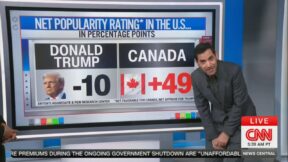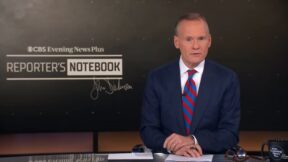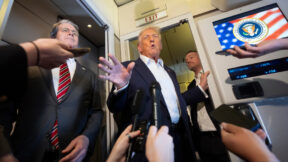‘OK, OK, Can We Call It Immunity?!’ Justice Gorsuch Gets Exasperated With Special Counsel’s Lawyer in Testy Exchange
During Thursday’s arguments in front of the Supreme Court for former President Donald Trump’s claim to have total presidential immunity, Justice Neil Gorsuch got audibly frustrated at Michael Dreeben, the lawyer representing Special Counsel Jack Smith.
The momentary spat was over semantics, and how to refer to immunity during their questioning:
Gorsuch: Let me just back up, though, just a second to what was a quick exchange with Justice [Bret Kavanaugh] that I just want to make sure I understand. Did you agree that there are some core functions of the executive that, president conduct, that Congress cannot criminalize?
Dreeben: Yes.
Gorsuch: So, is that a form– I mean, we can call it immunity or you can call it “they can’t do it,” but what’s the difference?
Dreeben: We call it an “as applied Article 2 challenge” that–
Gorsuch: Okay. Okay. Can we call it immunity just for shorthand’s sake? So I think we are kind of narrowing the ground of dispute here. It seems to me there is some, some area you, you concede that, in official acts, that Congress cannot criminalize. And now we’re just talking about the scope.
Dreeben: Well, I don’t think I said “just,” but I think it’s a very significant gap between any official act and the small core of exclusive official acts.
Gorsuch: I got that, but I want to explore that, okay? So, for example, let’s say a president leads a mostly peaceful protest sit-in in front of Congress because he objects to a piece of legislation that’s going through. And it, in fact, delays the proceedings in Congress. Now under 1512 C 2. That might be corruptly impeding an official proceeding. Is that core and therefore immunized or whatever word euphemism you want to use for that. Or is that not core and therefore prosecutable?
Dreeben: Well–
Gorsuch: Without a clear statement that applies to the president.
Dreeben: It’s not, it’s not core. The core kinds of activities that the court has acknowledged are the things that I would run through the Youngstown analysis, and it’s a pretty small set. But things like the pardon power, the power to recognize foreign nations, the power to veto legislation, the power to make appointments, these are things that the Constitution specifically allocates to the president. Once you get out–
Gorsuch: So a president then could be prosecuted for the conduct I described after he leaves office?
Dreeben: Probably not. But I want to explain the framework of why I don’t think that that would be prosecution that would be valid.
Watch the video above via CNN.




